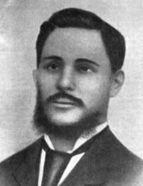

The thesis on the discovery of Brazil and the outlines of Brazilian society in the first century was a scientific work, predominantly, though not exclusively, influenced by Spencerian thought. Throughout the 1880s and the following decade, however, Capistrano de Abreu became aware of the fragility of the interpretations based on scientific determinism and the reduction of history, geography, and anthropology to the diktat of the natural sciences. His reading of German authors in those fields and his increasingly refined knowledge of archival documentation, as well as his propensity to deny the doctrinaire spirit, led him to abandon not only characteristically positivist or Spencerian explanations, but also the entire scientific foundation. He became an author who valued a thorough study of sources regarding the topic being researched rather than relying on dogma and preconceived ideas that simply used historical documents to confirm those existing beliefs. The emphasis Capistrano placed on sources in his interpretations does not imply that he became just another scholar focused on trivial details, as another contemporary, Silvio Romero — who held a rigidly Spencerian view — accused him of being. He remained engaged with the historical issues he deemed most significant for understanding Brazil's formation, but now deriving his conclusions from a solid foundation of interpretation. This second phase, typically hermeneutic is reflected in his mature works, such as Capítulos de História colonial , book published in 1907. However, a declaration of theoretical-methodological faith is not to be expected, as would become customary in the social sciences in the latter half of the 20th century. Between the scientific thesis of 1883 and the hermeneutic book of 1907, there is a transition in which this perspective is increasingly emphasised, with the author not feeling the need to justify his new position. It simply makes this clear throughout the interpretation. He seldom made the effort to discuss it, even informally. However, in private correspondence to the historian Afonso Taunay, in 1917, he casually remarked, "I was once absolutely Spencerist; I've changed..."
This work is financed by national funds through FCT - Foundation for Science and Technology, I.P, in the scope of the projects UIDB/04311/2020 and UIDP/04311/2020.
